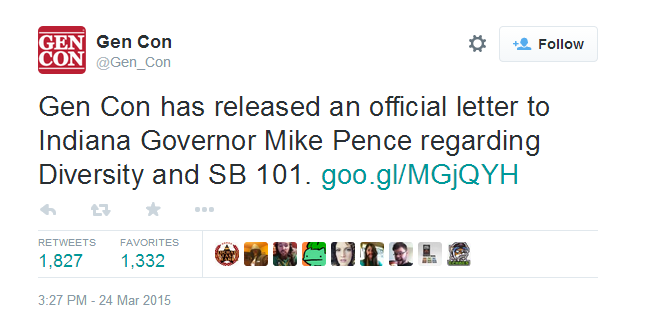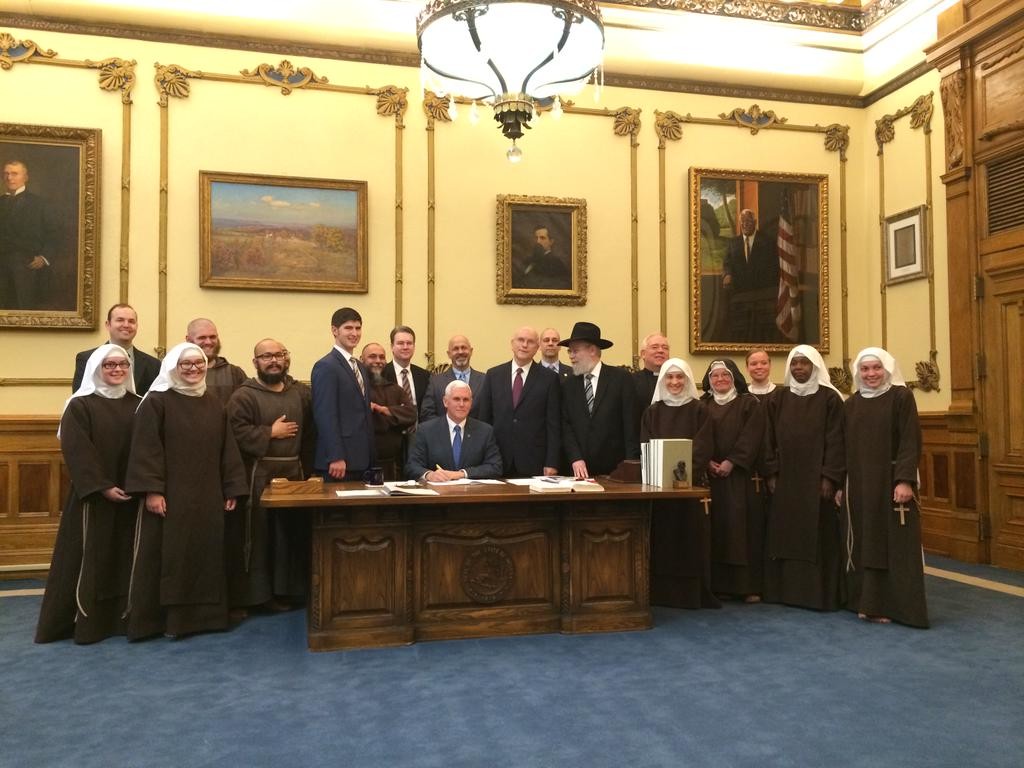This week Gen Con LLC (the company that runs Gen Con) sent an open letter to Indiana Governor Mike Pence threatening to look for a new state to host their conventions, due to the passing of SB 101 through the Indiana state legislature. SB 101, which is making the rounds in the media affectionately referred to as a “religious freedoms” bill, could offer protection to Indiana business owners to deny service to same-sex couples. The bill is entitled “Religious Freedom Restoration,” and the Governor plans on signing into law on Monday has been signed into law as of this morning in a private ceremony at his statehouse office, according to IndyStar.
 Gen Con LLC owner Adrian Swartout sent an open letter to the Governor regarding SB 101 over Twitter this past Tuesday, asking him to withdraw his support for the bill (which apparently had no effect on the Governor’s decision).
Gen Con LLC owner Adrian Swartout sent an open letter to the Governor regarding SB 101 over Twitter this past Tuesday, asking him to withdraw his support for the bill (which apparently had no effect on the Governor’s decision).
In his letter he stated, “Legislation that could allow for refusal of service or discrimination against our attendees will have a direct negative impact on the state’s economy, and will factor into our decision-making on hosting the convention in the stats of Indiana in future years.” He closed with a simple request – “We ask that you please reconsider your support of SB 101.”
Swartout seemingly saw that the only way to be heard wasn’t to appeal to a sense of human decency, but instead to fire a warning shot at their bank accounts. Sadly, in some matters, usually political, that can count for way more. Take a look at his full letter here.
Pence used Notre Dame University as an example for this law, namely their taking issue with a part of the Affordable Care Act that requires insurance coverage for contraceptives.
 In his news conference this morning, he stated, “Today I signed the Religious Freedom Restoration Act, because I support the freedom of religion for every Hoosier of every faith,” he said in a statement. “The Constitution of the United States and the Indiana Constitution both provide strong recognition of the freedom of religion but today, many people of faith feel their religious liberty is under attack by government action.”
In his news conference this morning, he stated, “Today I signed the Religious Freedom Restoration Act, because I support the freedom of religion for every Hoosier of every faith,” he said in a statement. “The Constitution of the United States and the Indiana Constitution both provide strong recognition of the freedom of religion but today, many people of faith feel their religious liberty is under attack by government action.”
Local companies like Salesforce, and even Republican Mayor Greg Ballard of Indianapolis spoke out against the bill. “I had hoped the Statehouse wouldn’t move in this direction on RFRA,” Mayor Ballard said. “but it seems as if the bill was a fait accompli from the beginning. I don’t believe this legislation truly represents our state or our capital city. Indianapolis strives to be a welcoming place that attracts businesses, conventions, visitors and residents. We are a diverse city, and I want everyone who visits and lives in Indy to feel comfortable here. RFRA sends the wrong signal.
In response to criticism that it could in fact lay a groundwork for discrimination, Pence had the following to say:
“This bill is not about discrimination, and if I thought it legalized discrimination in any way in Indiana, I would have vetoed it. In fact, it does not even apply to disputes between private parties unless government action is involved. For more than twenty years, the federal Religious Freedom Restoration Act has never undermined our nation’s anti-discrimination laws, and it will not in Indiana.”
So that being said, I don’t understand the motivation for this bill. If both the United States Constitution and the Indiana State Constitution both provide “strong recognition of the freedom of religion,” and that the federal version of the law never undermined any anti-discrimination laws, then why was this bill even needed? I’m reminded of the last scene in A Few Good Men, when Colonel Jessup was being questioned:
Kaffee: That’s not what you said. You said he was being transferred, because he was in grave danger.
Jessup: That’s correct.
Kaffee: You said he was in danger. I said “grave danger”? You said…
Jessup: I recall what I said.
Kaffee: I could have the court reporter read back to you…
Jessup: I know what I said! I don’t have to have it read back to me, like I’m…
Kaffee: Then why the two orders? Colonel?
Jessup: Sometimes men take matters into their own hands.
Kaffee: No, sir. You made it clear just a moment ago that your men never take matters into their own hands. Your men follow orders or people die. So Santiago shouldn’t have been in any danger at all, should he have, Colonel?
Jessup: You snotty, little bastard.
So why the two orders, Governor?
Tushar Nene
Staff Writer
@tusharnene












